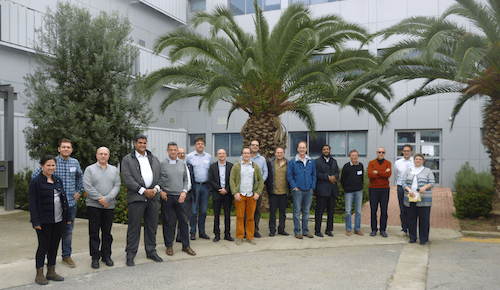
First step for a global network for improving regional climate change adaptation and impact assessment

The Cyprus Institute hosted the 1st CORDEX MENA-CA meeting, at its premises in Nicosia, Cyprus, on 27-28 November 2014.
The meeting involved around 20 renowned and high-level climate scientists and marked an important step forward in establishing CORDEX networks and activities in the Middle East, North Africa and Central Asia regions. In particular, the meeting involved the interaction between climate modelers, satellite observation experts and the climate change impacts community.
The meeting was held under the aegis of WMO’s World Climate Research Programme (WCRP), which together with The Cyprus Institute (CYI) has sponsored the event. Locally the meeting was organised by the Atmospheric and Climate Modelling Group of CYI, led by Prof. Jos Lelieveld.
Participants from Cyprus, Saudi Arabia, Egypt, Lebanon, Turkey and Morocco attended or were represented, in addition to scientists from Switzerland, Sweden, Italy, Germany and the USA. Among the participants were:
- Ms Carol Chouchani Cherfane, Chief of Water Resources Section at ESCWA,
- Dr Michel Rixen, Senior Scientific Officer at WMO/WCRP,
- Dr Grigori Nikulin (Rossby Centre/SMHI), member of the CORDEX Scientific Advisory Committee,
- Prof. Ahmad Wagdy, Vice-Dean for Graduate Studies & Research, Prof. of Hydrology, Irrigation & Hydraulics Department, Faculty of Engineering, Cairo University.
The CMCC was represented in the meeting by Edoardo Bucchignani from ISC Division.
The presentations and discussions during the 2-day event included updates on the regional climate model (RCM) simulations for the region performed by various groups, RCM evaluation with observations, including JPL/NASA’s RCMES systems, bias correction for optimum usage of models output for impact studies and coordination of future activities. The connections with the Regional Initiative for the Assessment of Climate Change Impacts on Water Resources and Socio-Economic Vulnerability in the Arab Region (RICCAR) were highlighted. Finally the need was stressed for further interaction with the satellite and ground observation community as well as end-users for impact studies, towards the building of a regional knowledge hub for climate change modelling and impacts for the Arab region.

